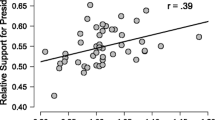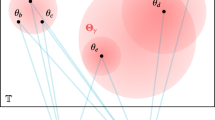Abstract
While we can judge and believe things by merely accepting testimony, we cannot make inferences by merely accepting testimony. A good theory of inference should explain this. The theories that are best suited to explain this fact seem to be theories that accept a so-called intuitional construal of Boghossian’s Taking Condition.
Similar content being viewed by others
Notes
In this paper, I use “inference” and “reasoning” interchangeably. This use differs, e.g., from that of Mercier and Sperber (2017) who use “inference” much more broadly than “reasoning.” On their way of talking, my topic here is reasoning and not inference. It may be interesting to see whether the issues below may tell us anything about a notion of inference that is broader than mine but narrower than that of Mercier and Sperber. However, such a discussion is beyond the scope of this paper.
According to reductionism about testimony, my justification for believing that P ultimately derives from my justification for believing such things as that you are trustworthy, that testimony I received in the past was reliable, and so on. Whether reductionism is true will not matter for my purposes.
E.g., if I believe that sexism is rampant in the Tesla factory because you say so, I wouldn’t believe it without your testimony, we believe the same thing, and your testimony isn’t merely a catalyst for my own thinking about the matter. If I believed it anyway, I wouldn’t believe in virtue of your testimony. If I believed something other than what you said, we would either not be communicating properly or I would draw my own inferences from what you told me. And if what you told me, e.g., reminded me of something that then caused me to think about the matter for myself and come to the conclusion that sexism is rampant at Tesla, this would again not be a case of believing on the basis of testimony.
These examples can easily be multiplied. Depending on your background views, you might like other examples better. Here is another one: Testimony of the following kind doesn’t, by itself, put you in a position to make the corresponding (defeasible) inference: “The last two chords in this jazz piece were an A-minor \(7{\flat 5}\) and a D dominant 7. Therefore, the next chord must be a G-maj7.” In order to make that inference, you must understand ii-V-I progressions. Merely accepting testimony cannot give you that understanding.
Another example may be a tweaked version of an anecdote about Srinivasa Ramanujan and Godfrey Hardy. Suppose that a mathematical genius is sincerely expressing her thoughts by saying: “The number of this cab is 1729. Therefore, the number of this cab is the smallest number expressible as the sum of two cubes in two different ways.” And suppose the genius makes the inference in one step and doesn’t use any other premises. As in the other cases, you cannot make the inference that the genius made simply by accepting the genius’s testimony. You will find this example plausible only if you think that “1729 is the smallest number expressible as the sum of two cubes in two different ways” isn’t necessarily a suppressed premise of the genius’s inference. I accept that, but my general point doesn’t depend on this claim about the particular example.
Some philosophers hold that there is an important kind of inference that is necessarily accompanied by a taking but that these inferences are not made because of that taking. Such theorists deny the second conjunct of Boghossian’s (2014) Taking Condition. Koziolek (2017), e.g., holds that what he calls an “epistemically successful self-conscious inference” is, by definition, a cause of the subject’s knowledge that she is making such a good inference. And Mercier and Sperber (2017) hold that what they call “reasoning” (in contrast to what they call “inference”) is partly constituted by a representation of one’s premises as good reasons for one’s conclusion, but they hold that such a representation is usually a result (often a kind of rationalization) of the move from the premises to the conclusion and not a cause of that move. Someone who holds a theory like that cannot explain the fact that we cannot infer by accepting testimony by appealing to the claim that takings are not transmissible via testimony. After all, on such views, even inferences that are necessarily accompanied by takings don’t require that the taking is present before (or even at) the time of the move from the premises to the conclusion. Hence, such views must provide an alternative explanation. A discussion of this interesting family of views is beyond the scope of this paper. With respect to what I say here, such views face the same problems as skepticism about takings.
Some ways of reasoning, like reasoning in accordance with modus ponens, are so basic that it is hard to see how one could give any explanation that doesn’t presuppose this kind of reasoning. That doesn’t mean that no understanding is required.
A variant of this reaction says that we cannot infer by accepting testimony because doing so would require that the belief in the conclusion is caused by the testimony, in which case it wouldn’t be the conclusion of an inference. This reaction misunderstands my question. I ask why accepting testimony, unlike understanding explanations, cannot put in place the necessary conditions for the conclusion belief to be caused in the right way. I am emphatically not asking why the belief in the conclusion of an inference cannot be caused by testimony.
Judgments that are conclusions of inferences are also defined—in some sense—by their “origin,” namely by the fact that the subject infers them from the premises. Our question is not, however, why we cannot acquire inferential judgments by accepting testimony. Our question is why we cannot make whole inferences by accepting testimony.
As will become clear below, the intuitional construal can be seen as motivating and embracing this thesis.
More generally, my point is independent of the semantics of “therefore” (Pavese 2017). The language that the subject speaks need not have an expression like “therefore” for my point to hold.
The same holds for views on which takings are involved in some inferences or reasoning but are the effect and not a cause or prerequisite of those inferences, e.g., the view of Koziolek (2017) or the one of Mercier and Sperber (2017). I cannot discuss these views in detail here, but as far as I can see they are vulnerable to the objection that I raise in this paragraph. It may be that such views are better placed to give the required alternative explanation than, e.g., the doxastic construal of the Taking Condition. Thus, what I say here can be understood as a challenge regarding such views, namely a challenge to spell out an alternative explanation for why inferences cannot be transmitted via testimony. I cannot see any obvious way in which they could do that, but I also don’t have a knockdown argument against all possible explanations that advocates of such views could develop in the future. As an anonymous referee points out, one promising strategy may be to say that what is missing in the relevant cases is an inferential ability that can be passed on via explanations but not via testimony because it is or requires a cognitive condition that testimony cannot bring about. To know whether this view is incompatible with or complementary to what I say here, the view would need to be spelled out in more detail. After all, the cognitive condition in question may or may not be an intuition.
On Sinan Dogramaci’s (2013) view, the intuition is a conditional intuition and not an attitude toward a single content. That doesn’t matter for my point.
References
Boghossian, P. A. (2014). What is inference? Philosophical Studies, 169(1), 1–18.
Broome, J. (2014). Comments on Boghossian. Philosophical Studies, 169(1), 19–25.
Chudnoff, E. (2014). The rational roles of intuition. In A. Booth & D. Rowbottom (Eds.), Intuitions (pp. 9–35). Oxford: Oxford University Press.
Dogramaci, S. (2013). Intuitions for inferences. Philosophical Studies, 165(2), 371–399.
Grimm, S. R. (2006). Is understanding a species of knowledge? British Journal for the Philosophy of Science, 57(3), 515–535.
Hills, A. (2016). Understanding why. Noûs, 50(4), 661–688.
Koziolek, N. (2017). Inferring as a way of knowing. Synthese, online first.
McHugh, C., & Way, J. (2016). Against the taking condition. Philosophical Issues, 26(1), 314–331.
McHugh, C., & Way, J. (2017). What is reasoning? Mind, 127, 167–196.
Mercier, H., & Sperber, D. (2017). The Enigma of Reason. Cambridge: Harvard University Press.
Neta, R. (2013). What is an inference? Philosophical Issues, 23(1), 388–407.
Pavese, C. (2017). On the meaning of ‘therefore’. Analysis, 77(1), 88–97.
Pritchard, D. (2016). Seeing it for oneself: Perceptual knowledge, understanding, and intellectual autonomy. Episteme, 13(1), 29–42.
Quilty-Dunn, J., & Mandelbaum, E. (2018). Inferential transitions. Australasian Journal of Philosophy, 96(3), 532–547.
Stroud, B. (1979). Inference, belief, and understanding. Mind, 88(350), 179–196.
Thomson, J. J. (1965). Reasons and reasoning. In M. Black (Ed.), Philosophy in America (pp. 282–303). Ithaca: Cornell University Press.
Valaris, M. (2014). Reasoning and regress. Mind, 123(489), 101–127.
Winters, B. (1983). Inferring. Philosophical Studies, 44(2), 201–220.
Wright, C. (2014). Comment on Paul Boghossian, “The nature of inference”. Philosophical Studies, 169(1), 27–37.
Acknowledgements
I am very grateful for invaluable comments on earlier drafts that I received from John McDowell, Ori Beck, Katharina Nieswandt, Robert Brandom, James Shaw, Karl Schafer, and an anonymous referee.
Author information
Authors and Affiliations
Corresponding author
Additional information
This work was supported by the research project ‘Excellence at the University of Hradec Králové’.
Ulf Hlobil affiliated faculty at the University of Hradec Králové.
Rights and permissions
About this article
Cite this article
Hlobil, U. We cannot infer by accepting testimony. Philos Stud 176, 2589–2598 (2019). https://doi.org/10.1007/s11098-018-1142-3
Published:
Issue Date:
DOI: https://doi.org/10.1007/s11098-018-1142-3




